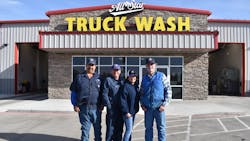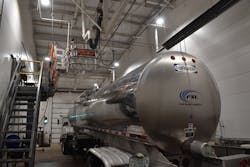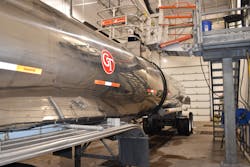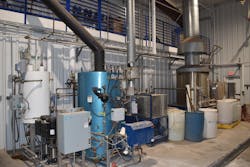Mike Cleavinger spent 30 years as a farmer working fields in West Texas before deciding to change career paths.
He found a new row to hoe in Lubbock, Texas.
The former farmer now runs All-Star Truck Wash & Lube, which has two locations in the city, the original, fully renovated site in downtown Lubbock, and a state-of-the-art truck wash with tank trailer cleaning services that opened in February 2020 at the corner of I-27 and Loop 289, a busy intersection for truck traffic.
The I-27 location, in north Lubbock, boasts modern tank wash equipment, diverse tank cleaning capabilities, and an upgraded driver lounge that offers free WiFi, TV, coffee, fresh popcorn, clean restrooms, and showers. The facility serves tank truck drivers and carriers from 7 a.m. to 7 p.m. Monday through Saturday.
Bulk Transporter recently spoke with Cleavinger about the evolution of tank cleaning, All-Star Truck Wash’s foodgrade services, and how the company is responding to the Occupational Health and Safety Administration’s new regional emphasis programs (REPs) for transportation tank cleaning operations in Regions V and VI.
Questions and answers are edited for length and clarity.
Bulk Transporter: How did you get into the tank-cleaning business?
Mike Cleavinger: “In January of 2015, I bought what was then called Racer Truck Wash. At the time I purchased the company, Racer was performing foodgrade washouts mostly for a couple of large companies that were hauling cotton oil out of Lubbock. After I bought the company, it became apparent to me there was more business out there, but the age and antiquation of the facility was stifling interest in doing business with us. Having a state-of-the-art tanker washout facility was the main reason I decided to build the new facility.”
BT: What sets All-Star Truck Wash apart from other tank-cleaning operations?
MC: “Our business model is unique because of the various services we perform. We offer exterior washes at both locations with the options of a straight wash or brightener, citrus, spray-on wax, engine steam, and tire dressing. We do a full line of foodgrade washouts, including Kosher maintain and Kosher upgrade. We also have a Grade A milk permit from the Texas Department of State Health Services regulatory licensing unit, allowing us to perform milk tanker washouts. We also wash out foodgrade dry bulk pneumatic trailers. All of these washouts come with a detailed wash report describing the wash in words and graphs. Utilizing the boiler and vat system in our chemical washout bay, we can clean out acids, caustics, friction reducer/polymers, crude oil tankers, herbicide tankers, and a wide assortment of blends used in the oilfield.
“At our original Avenue A location, along with the exterior washes, we do oil changes and tractor-trailer lube jobs. Our yard at the new facility is large enough to allow our customers to drop-and-hook, and the lobby area comes complete with showers for our customers’ convenience. All interior walls are finished with Extrutech siding, which is a polyurethane panel that is durable and easy to clean. Our bays are always kept clean and smelling good.”
BT: OSHA currently has an REP for transportation tank cleaning operations in Texas. How do you promote tank wash safety?
MC: “Robby Day and Miranda McMas with The Peacock Company designed and built most of the equipment that was installed in our facility. They have decades of experience between them, and they made sure worker safety was built into the facility. The washout bays both have a mezzanine with a gangway and safety basket that lowers down over the tanker dome lid area. All bays have hose reels to keep hoses off the ground and racks to hang brushes. The bays are kept clean and organized to eliminate tripping and falling on scattered equipment. Ed Wickham, with A-One Chemicals and Equipment, who designed, built, and installed the equipment for our chemical washout bay, is very safety-oriented, and worker safety was a high priority while planning that project. Through Ed, I met and am working with Johnny Wyrick with Environmental Safety Sales and Rentals. Johnny is an expert in the field of safety in tanker washout facilities and supplies us with equipment and training needed to protect our employees.”
BT: How have tank-cleaning processes evolved over the years?
MC: “When I bought the truck wash, we were putting a man with a high-pressure, hot water gun in a tanker and he hand-washed it. The wash was well done but took a lot of time and was a very uncomfortable situation for the guy in the tanker. At our new location, we utilize the Peacock 660 and a spinner system in the foodgrade wash bay. The system is preprogramed with washes for a long list of commodities. If we need to add a commodity or tweak an existing program, that process is very easy to accomplish. Most wash cycles have a duration of 35 minutes, with 25 minutes at 180 degrees, a five-minute caustic detergent injected into the stream, and a sanitizer injection if requested. The 660 operates at 600 psi and 30 gallons per minute, and offers up to three chemical or detergent injection possibilities. We are also equipped with a high-volume blower to dry the tanker out when the wash is completed. Afterward, a computer-generated report provides a written detail of the wash, and the temperature used is reported in the form of a graph, making it very understandable and easy to read.
“With this equipment and system, we can perform Kosher maintain washouts and Kosher upgrade washouts. The program for our Kosher upgrade is a 40-minute wash. The water leaving the tanker has to maintain at least 195 degrees for 20 minutes, along with a five-minute detergent injection and a five-minute sanitizer injection. The wash report will be emailed to the rabbi selected. The 660 system is also great for washing out foodgrade pneumatic trailers. The boiler and vat system I had installed in the chemical washout bay equips us to wash out extremely tough products like friction reducers and polymers, and washouts for easier products such as caustics, acids, hydrogen peroxide, and many other products are easily and quickly accomplished. Another advantage to this system is the ability to perform in-transit steam to heat a product that needs to be delivered at a specific temperature. We can utilize the in-transit steam without interfering with other operations going on in the chemical washout bay. These improvements have made the job of tanker washouts much easier and safer. My employees love it.”
BT: How do you ensure the integrity of foodgrade washouts?
MC: “The washes we offer are foodgrade, Kosher maintain, Kosher upgrade and milk tanker washouts. Each of these washes includes washing of hoses as requested, pumps disassembled, washed, and reassembled, the dome lid and crash area steam-cleaned with detergent and high-pressure hot water, and the discharge area steam-cleaned with detergent and high-pressure hot water. Seals will be attached as requested and a wash report with all the details of the wash recorded, including the seals. To ensure the integrity of the wash, we start with a well-trained staff using state-of-the-art equipment in a clean, fresh bay. After each wash, a visual inspection is performed to ensure the trailer is clean and ready for the next load.”
About the Author
Jason McDaniel
Jason McDaniel, based in the Houston TX area, has more than 20 years of experience as an award-winning journalist. He spent 15 writing and editing for daily newspapers, including the Houston Chronicle, and began covering the commercial vehicle industry in 2018. He was named editor of Bulk Transporter and Refrigerated Transporter magazines in July 2020.




